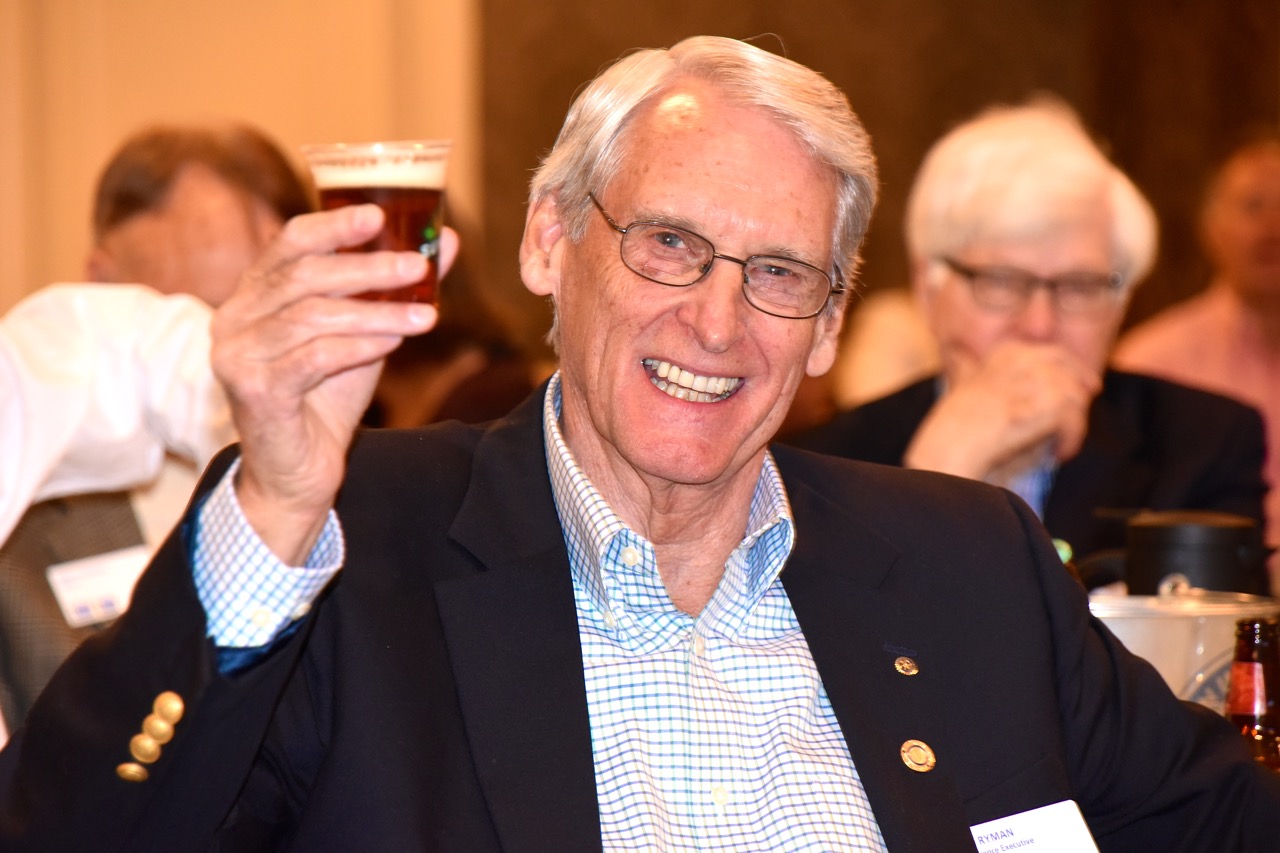In review
Posted by Hugh Hadlund on Apr 06, 2017
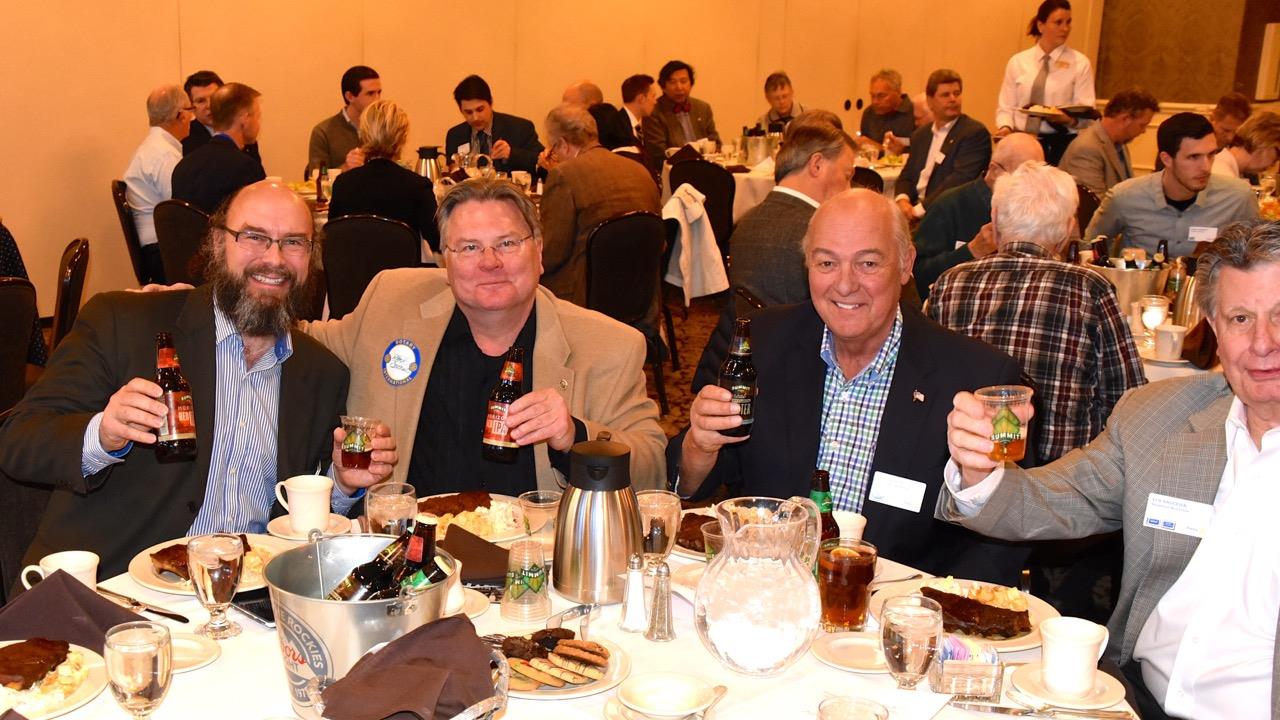
At the Thursday, April 6, Rotary Club of Edina meeting, the program speaker was Mark Stutrud, founder and president of Summit Brewing Co. He shared his story of being a brewing sod-buster, and also shared brews with the lucky attendees. New member Mark Stageberg was officially inducted into the club.
Click on the link below for more about the meeting...
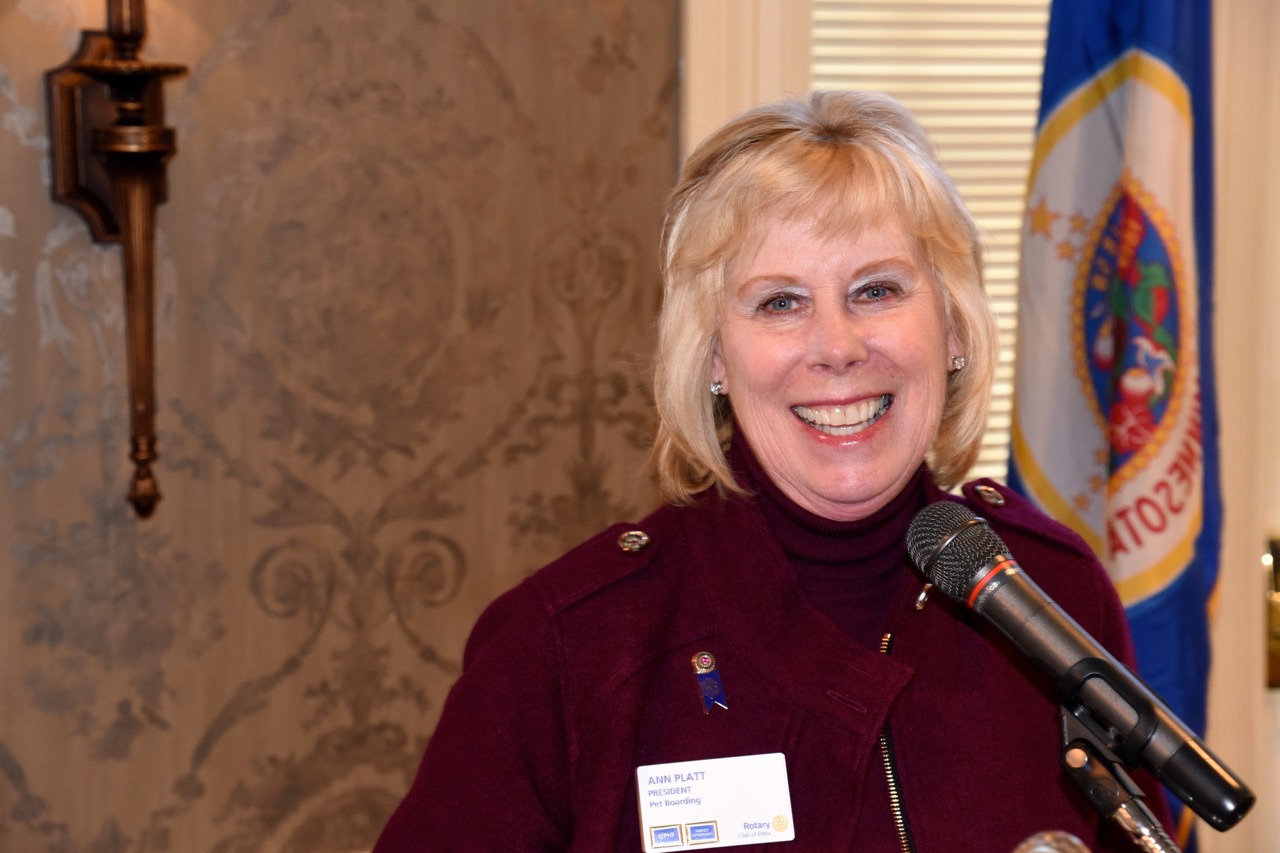 Club President Ann Platt brought today’s meeting to order.
Club President Ann Platt brought today’s meeting to order.The following announcements and recognition were given:
Monday evening the City of Edina held its 38th annual Volunteer Recognition Reception, at which outstanding volunteers were recognized. Among those recognized were Gary Pedersen, who was recognized as the Edina Rotarian of the Year, in part because of his dedication to the International Service water filtration and sanitation project in Guatemala. This includes fund raising and grant writing for the project, which will put $308,000 towards the project. Gary also had the opportunity to visit the project site in Guatemala and meet many people whose lives are impacted by the project.
The Mayor’s Commendation was also presented to Camp Enterprise in the “Service To Youth” Award. Our club was well represented for Camp Enterprise by Kip Peterson and Sam Thompson, recognized for their leadership of the Camp E.
The Mayor’s Outstanding Senior Commendation was awarded to Rotarian Frank Cardarelle, for his long-term commitment to the Edina Historical Society (Frank was a charter member of the Historical Society in 1969), and serving as liaison between the Historical Society and the Rotary Club for almost five decades.
Helping out with today’s meeting were:
- Greeters—Past President Steve Slyce, Kenny Smith and Nash Faulk
- Assisting Club Administrator Jennifer Garske at the front desk was Will Steinke
- The invocation was given by John Flynn, who also led us in the Pledge of Allegiance and the Rotary Four-Way Test.
- Visiting Rotarians and guest were introduced by John Buttolph
- The Barker was written by Hugh Hadlund
- The speaker was introduced by Tom Ries
- The speaker was thanked by Ken Andersen
The following guests were introduced at the meeting:
- Jim Fisher, guest of Jody Kern
- Duane Schley, guest of his wife, Sandy Schley
- Heather Edelson, visiting for a third time, was the guest of Josh Sprague
- Kelly Burnett, also visiting for the third time, was the guest of Sam Cote
- Stephen Thomas, guest and son of Skip Thomas
- Alex Barnett, guest and son of Jon Barnett
- Jennifer Shinners, who has just submitted her application for club membership, was the guest of John Buttolph
- Jeff Wosje, was visiting from the Plymouth Rotary Club
Ann Platt advised club members that the District 5950 Conference will be April 28 at the Westin in Edina and our club will reimburse each member for one session, up to $60. Everyone is encouraged to attend.
Our next Prospective Member Day will be April 27. We were each encouraged to invite a friend who may be interested in becoming a Rotarian to the meeting that day.
Brandon Azbill shared that 66 West, where the community room is our Signature Project for this Rotary year, has a need for help in assembling furniture. Contact Brandon about volunteering to help with this part of our project, which is required as part of the District matching grant. Club members were encouraged to attend the Open House at 66 West April 20 from 6 to 8 p.m.
Dan Hallberg, Past Club President and Past District Governor, announced that Thursday, April 20, is the annual Area 3 Rotary Vocational Ethics Day held during our club’s normal meeting time, but starting earlier, at 11:30 a.m. Seven Rotary clubs participate. This is the tenth year for the event. Michael Bellotti will be the speaker, and he will be telling his story, “How Art Saved My Life."
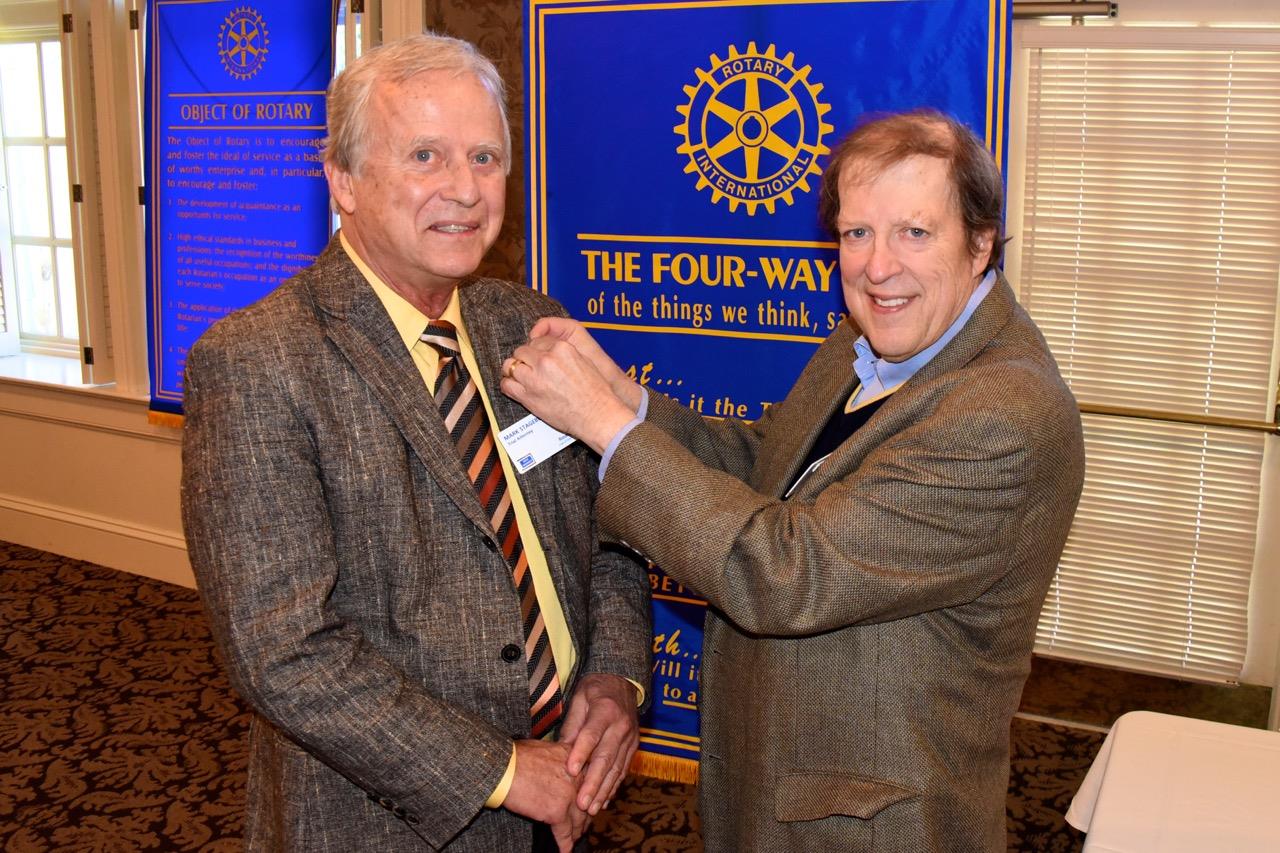 Another new member of our club was officially inducted by Steve Slyce and the sponsor, Keith Benson, at the meeting. Welcome Mark Stageberg!
Another new member of our club was officially inducted by Steve Slyce and the sponsor, Keith Benson, at the meeting. Welcome Mark Stageberg!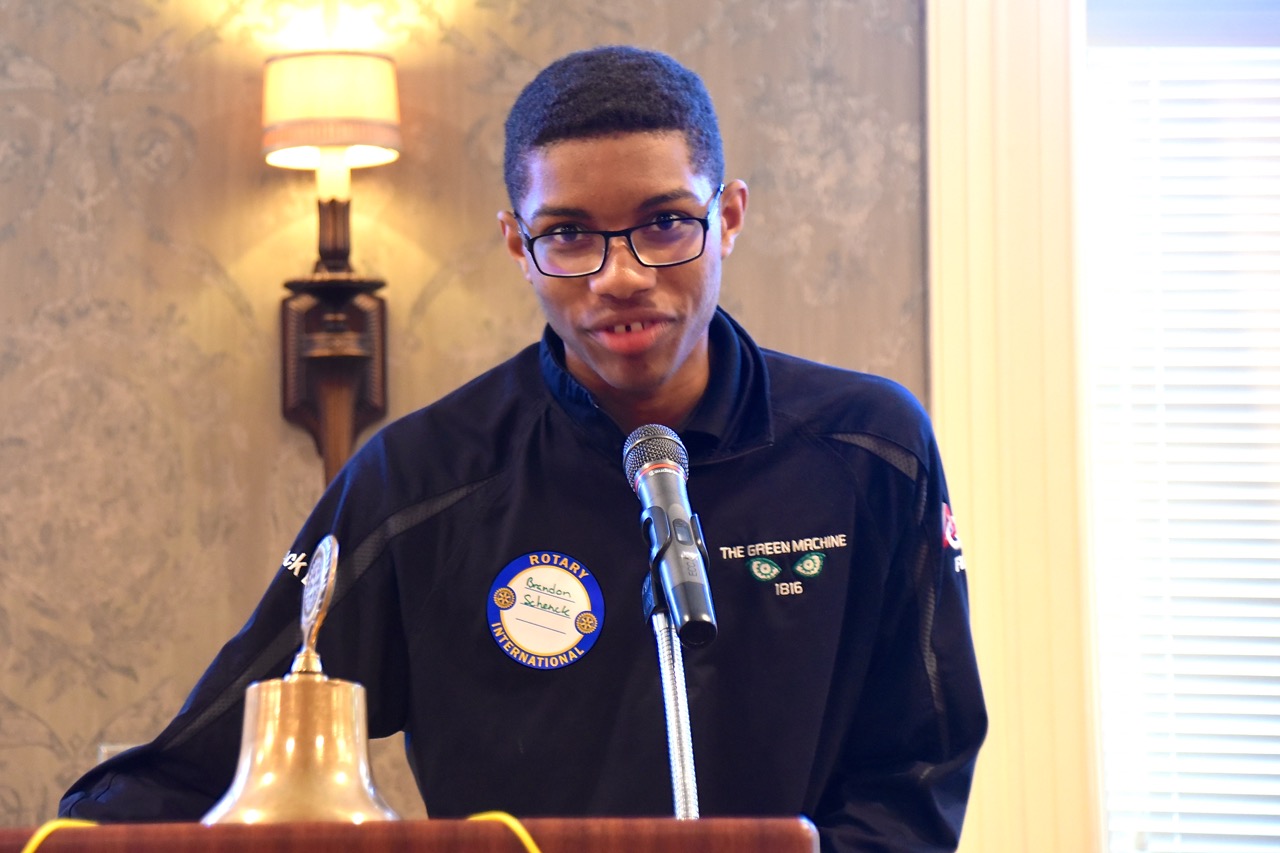
Ann Platt brought Val Burke to the podium, who introduced two Edina High School students who joined us today, Brynn Liabraaten and Brandon Schenck. Both are seniors this school year and shared their future plans with us.
Tom Ries introduced our speaker today. Tom’s introduction of his close friend, Mark Stutrud, founder and president of Summit Brewing Company, 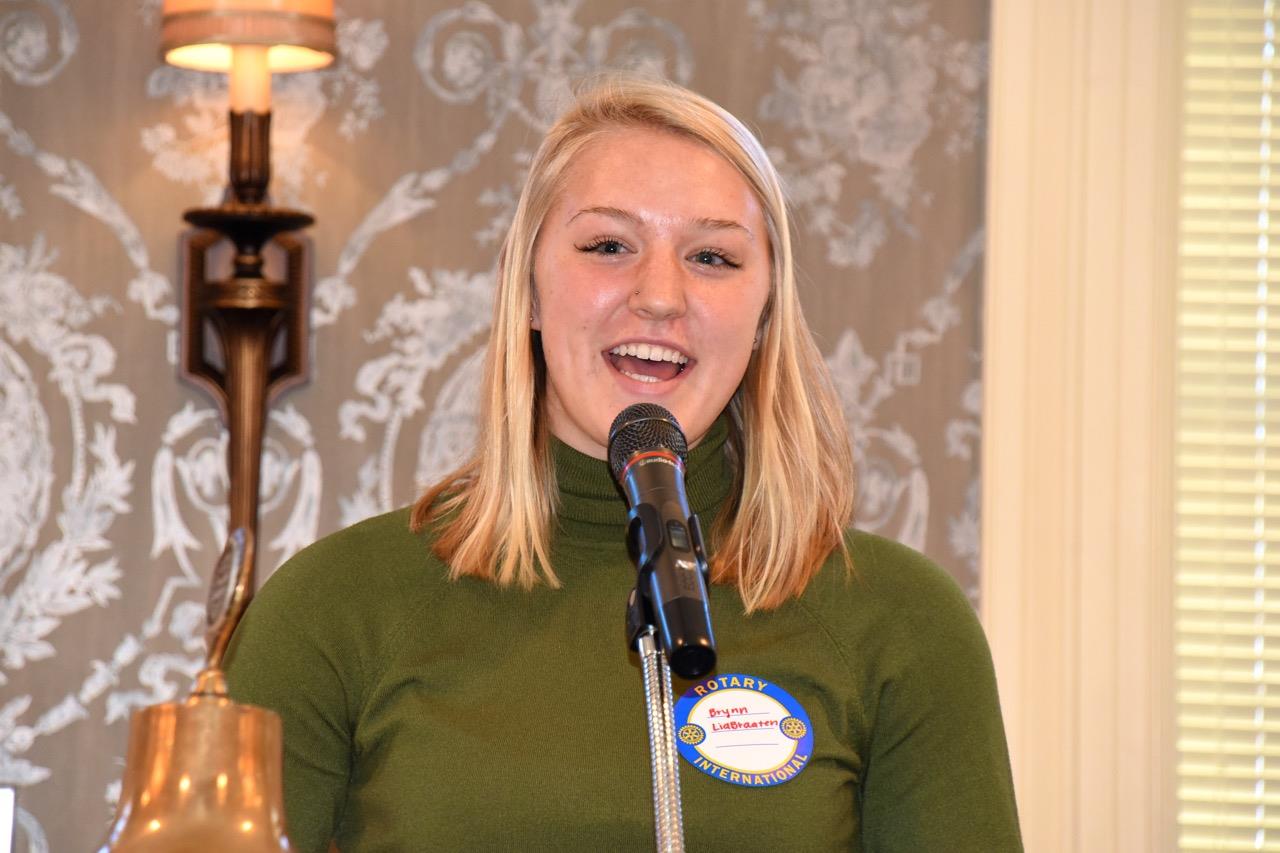 included the following quote from Ben Franklin, “Beer is proof that God loves us and wants us to be happy."
included the following quote from Ben Franklin, “Beer is proof that God loves us and wants us to be happy."
 included the following quote from Ben Franklin, “Beer is proof that God loves us and wants us to be happy."
included the following quote from Ben Franklin, “Beer is proof that God loves us and wants us to be happy."Mark began his remarks regarding “Experiences Being a Brewing Sod-Buster” by sharing the background of the Summit Brewing Company name as:
- It identifies the company with St. Paul, because of Summit Avenue.
- Back in 1983, when Mark did a trademark search, there had never been a Summit Brewing Company in the United States.
- And finally, “Summit was a hell of a lot easier to say than Stutrud.”
Mark shared his heritage was 50 percent Norwegian and 50 percent Swedish. He indicated that he frequently refers to himself as a "sod-buster" and a pioneer in the brewing industry. This is in respect to his grandparents, who emigrated from Norway (on his father’s side) and ended up out in western North Dakota, where it is easier to raise rattle snakes than durum wheat. He shared his admiration for his grandparents being able to make a living in that part of the country.
Mark’s father left the family homestead. Mark's grandfather wanted Mark's father to take over the homestead, but Mark’s dad indicated to his father (Mark’s grandfather) that he thought it was time to purchase a tractor. To which Mark’s grandfather replied “as long as there are farms, there will be horses." Mark’s grandfather used horses on the farm until 1952. Mark offered this as the best definition of stubbornness he could think of. He indicated that this notion of stubbornness was deeply ingrained in him. He stated that it was that stubbornness, that his mother would have affirmed and his dad would say “the kid never took 'no' for an answer” was the basis of his perseverance in bringing Summit Brewing to fruition.
Mark described his path to the beer brewing business. He stated he he graduated from the University of North Dakota in Grand Forks. He had a clinical degree in social work, was a trained family therapist, with a special focus of working with adolescences and young adults who had substance abuse and addition problems, which he worked with for about eight years.
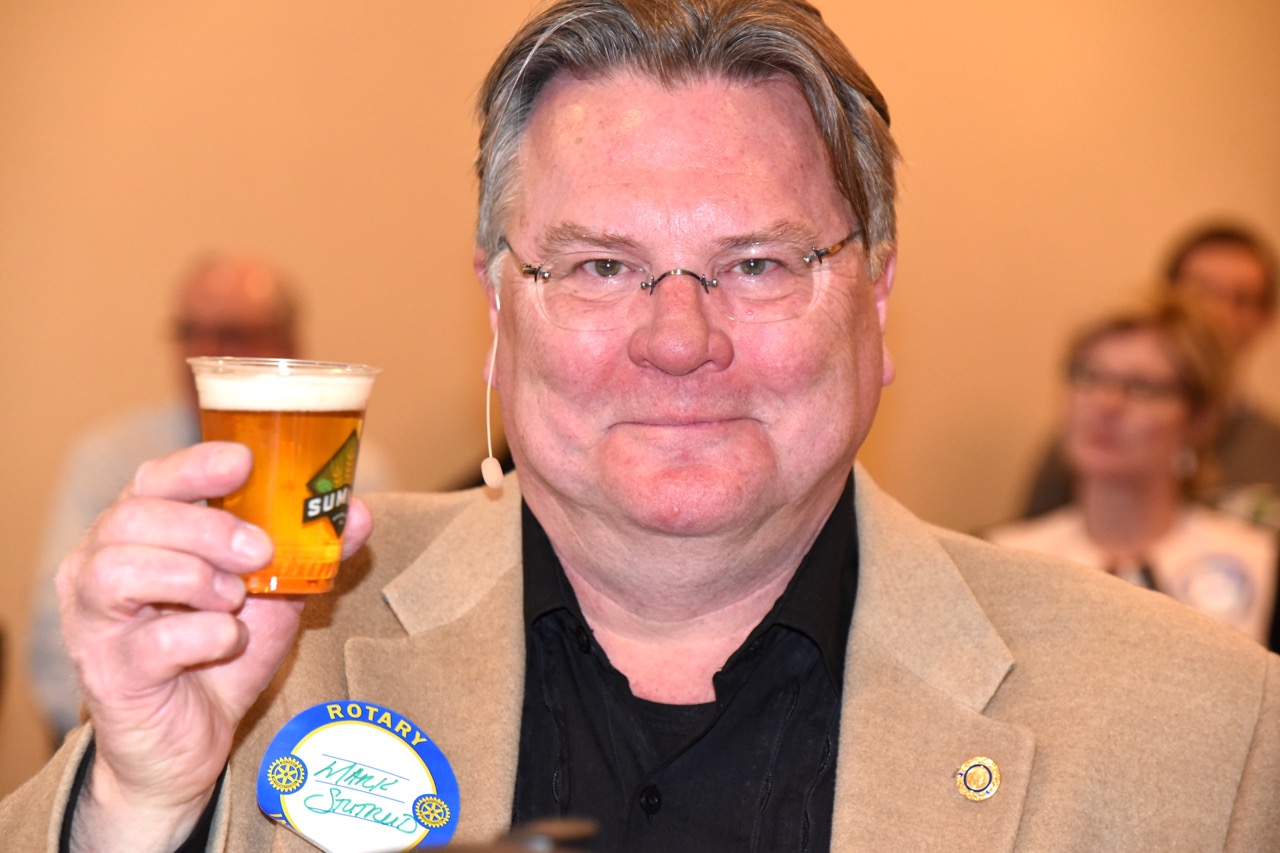
Mark shared that his dad was trained as a printer, owned a small county seat newspaper for about 10 years, then became a teacher. Mark's mom was a school teacher as well, and Mark grew up with the value of “you make something for a living." Dad was not amused when Mark got his degree in social work, stating “you are just another of those characters that needs more help than somebody else." After achieving success in social work in North Dakota, Mark moved to the Twin Cities in 1980, to work at St. Mary’s Hospital, supervising the evaluation unit of the Adolescent Chemical Dependency Unit. Fast forwarding to 1982, when Mark started talking about opening a brewery, as he said, “you can only imagine what my father thought."
Going back to the notion of starting a brewery, Mark wasn’t tired of working with the kids, their families or the staff he worked with, he found himself stuck in that classic mid-management role, where he had a lot of responsibility, but no authority. That was the strongest stimulus for Mark’s decision to do something on his own. In 1981 Mark thought of going to medical school and continuing in psychiatry. But remembering the two psychiatrists he was fighting with daily, he also thought about going into private practice. The third and wackiest idea was “why not a brewery?"
He had been a home brewer for several years and beer was his first choice of alcoholic beverages, but home brewing was just a seed/or introduction into the industry. During Mark’s last two years at St. Mary’s, he spent all vacation time apprenticing at a couple breweries across the nation, experiencing an acid test, determining what the life style and demands were on a daily basis. He also was doing research and meeting other people in the industry. He met two master brewers— one from St. Paul who was retired and eventually became Mark’s mentor.
During Mark’s feasibility study of brewing in 1984, he lost his job. This really propelled him to take the risk of going into beer brewing in earnest. After additional research, Mark began attending brewing school in Chicago. While he felt he had enough knowledge, he also felt he needed to retool himself in preparation for his start-up venture. At the time, he was reading a book titled “If You Meet the Buddha on the Road, Kill Him!", by Sheldon B. Kopp. A key principal that Mark took away from the book was, among all the most meaningful decisions we have to make in this life, they are all based on insufficient data. It is a saving grace that we cannot predict the future, because if we knew what was around the corner, we would play it safe.
Mark reiterated that with both of his parents being educators, he was not brought up in a business environment. After all the personal retooling, apprenticeships and brewing school, he started focusing on getting the brewery together, including among other things, the financing. He shared the challenge of coming from his North Dakota, social worker background, and asking investors for $10,000. Mark shared that it was about 1,400 cold calls, to get 600 appointments to get the first 20 investors (this was in 1984, when more breweries were closing).
He went on to share that when he would sit with possible investors, it was common for them to ask “what kind of beer are you going to make? What is pale ale, and all these traditional styles you wish to brew?” As part of his journey, he found business counseling through SCORE, which Mark said was a fantastic organization, which also provided mentorship. Mark was mentored by Jerry Vogal, who owns a beverage company in St. Paul.
The business started in 1986, with five employees, located in 7,500 square feet of leased space. Today Summit Brewing has a custom brewery—the first brewery to be built from the ground up since the repeal of prohibition in the state of Minnesota—with construction finished in December 1998. That brewery is truly a testament to Summit’s customers. Our Club was encouraged to come to St. Paul for a tour of the brewery, go to Summit’s website for all the necessary tour information.
Today Summit Brewing has 108,000 square feet of space, 100 employees, producing about 120,000 barrels of beer a year. Of those barrels, 87 percent of the beer stays in Minnesota, and the Twin Cities accounts for 72 percent of total company sales. The sales are made of draft beer, accounting for 40 percent of sales; 45 percent bottled; with the remainder of sale being in cans.
The Summit Brewery journey has not only been marvelous, it has also taken a lot of work, but things have also changed in the past five to 10 years. Presently, a brewery opens up almost every week and with that, the dark side is that there is a lot of substandard beer out there. Making a consistent glass of beer time and time again is a very difficult manufacturing model, which takes a lot of attention to detail.
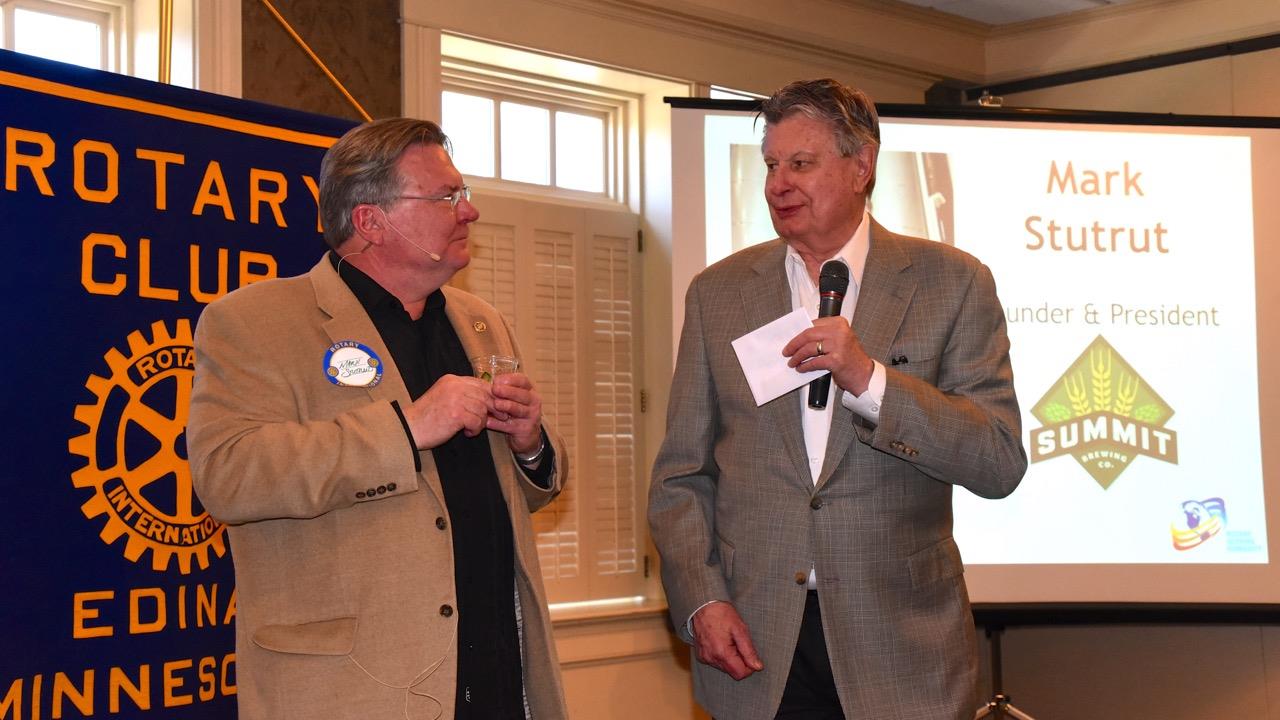
Finally, it will be interesting, with all the new entrants to the market, if they really appreciate the life style or the technical demands of this kind of work over the long haul. And at the same time, the industry is dealing with younger consumers, categorized as “promiscuous," that do not value brand loyalty. It’s all about the “experience,” and the experience has to be different every time. As a brewer, making a different batch of beer every week or month is not a sustainable business model so as to keep someone entertained. Summit is literally all about bringing true beer culture back into our society and having a deep appreciation of the history and the types of beer that have developed over thousands f years.
Ken Andersen thanked Mark for his presentation and indicated that our Rotary Club would make a gift on Mark’s behalf to Edina Give and Go, to help children who need financial assistance. Ann Platt also thanked Mark for his presentation. Ann also shared that Mark is a member of the St. Paul Rotary Club.
Ann concluded the meeting by sharing that next week’s speaker will be Mike Max from WCCO Radio and TV. In closing, Ann shared the following quote by golf legend Arnold Palmer, “The most rewarding things to do in life are often the ones that look like they cannot be done." As you go forward in the coming week, think about how Paul Harris must have felt when he started Rotary, and how his legacy of Rotary continues to serve humanity.
